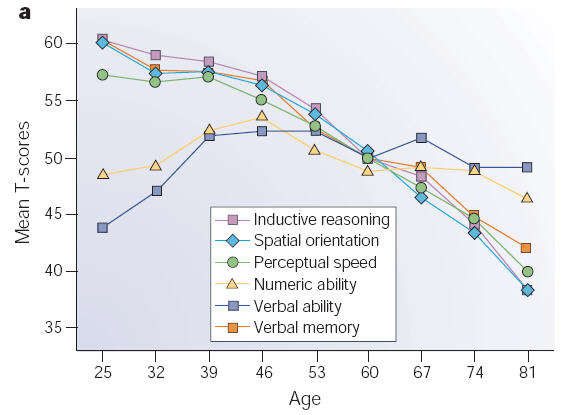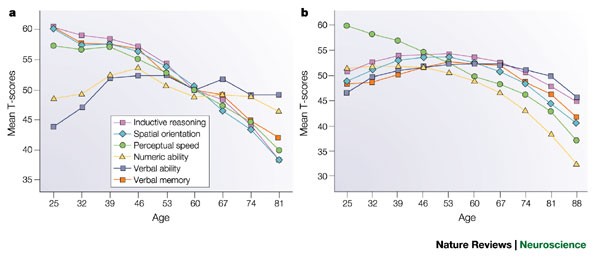Our cognitive abilities change as we age.
How they change over time depends on the specific skill.
In this article, we’ll cover the main cognitive functions and how they vary based on age.
Summary – Cognitive Abilities by Age
Inductive Reasoning
- Generalizations from specific observations.
- More accurate in younger adults.
- Declines begin mid-20s, accelerate in 50s.
- Chess players’ performance decline example.
Spatial Orientation
- Declines with age.
- Difficulty increases with complex spatial tasks, like 3D objects.
- Linked to changes in the brain’s white matter.
Perceptual Speed
- Ability to quickly process information and make decisions.
- Starts declining in late 20s or early 30s.
- Linked to changes in white matter integrity.
Numeric Ability
- Improves until mid-40s, then slightly declines.
- Minimal difference between 20s and 80s.
- Supported by multiple studies.
Verbal Ability
- Involves use and understanding of words.
- Improves with age, better in 80s than in 20s.
Memory
- Episodic memory declines from age 40.
- Decline rate varies by task; worse at recalling words than images.
Verbal Memory
- Declines starting around age 40.
- Partially linked to white matter changes.
Working Memory
- Used for temporary information storage and manipulation.
- Declines slower than inductive reasoning or perceptual speed.
- Some aspects may improve with age, e.g., story gist recall.
- Drop-off linked to changes in frontal lobe function.
Long-term Memory
- Generally improves with age.
- Decline in certain types starts in middle age.
- Older adults recall childhood events well but struggle with recent events.
Perceptual Memory
- Declines from age 40.
- Older adults may remember images better than younger adults.
Attention
- Ability to focus amidst distractions.
- Declines from age 40.
- Older adults might ignore distractors more effectively.
Multi-tasking Ability
- Declines with age.
- Linked to white matter integrity changes.
Inductive Reasoning
Inductive reasoning involves making generalizations based on specific observations or examples.
This type of reasoning is usually more accurate in younger adults.
Inductive reasoning has one of the steepest dropoffs with age, with declines starting in the mid-20s and becoming faster in one’s 50s.
This is an example of why chess players, for example, tend to decline with age.
Spatial orientation
Orienting oneself in space usually declines with age.
There is evidence that older adults have more difficulty with complex spatial tasks, such as those involving 3D objects.
This decline may be due to changes in the brain’s white matter, which connect different regions of the cortex.
Perceptual speed
Perceptual speed is the ability to take in information and make decisions quickly.
It declines relatively slowly with age, starting in the late 20s or early 30s.
One study found that this decline could be partially explained by changes in white matter integrity.
Numeric ability
Numeric ability tends to rise with age until one’s mid-40s, then taper off, but only somewhat.
By one’s 80s it’s not much worse than one’s 20s.
This finding has been replicated in multiple studies.
Verbal ability
Verbal ability involves the use of words, including the ability to remember words, understand their meanings, and produce them when speaking.
Verbal ability tends to rise with age. In fact, it tends to be better in one’s 80s than in one’s 20s.
Cognitive functions by age

Same graph as above (left) and smoothed version (right)

Memory
There are several types of memory, but the most well-studied is episodic memory, which is our memory for specific events.
Episodic memory generally declines with age, starting around the age of 40.
The rate of decline varies depending on the specific memory task being tested. For example, one study found that older adults were worse at recalling words after a delay, but not as bad at recalling images.
Verbal memory
Verbal memory involves the ability to remember words and their meanings.
It generally declines with age, starting around the age of 40.
One study found that this decline could be partially explained by changes in white matter integrity.
Working memory
Working memory is our ability to store and manipulate information in our minds for a short period of time.
This is what we use when we are doing mental arithmetic or trying to remember a list of groceries to buy.
However, this decline is much slower than that of inductive reasoning or perceptual speed.
One study found that about 25% of the variation in working memory performance was due to age.
While working memory generally decreases with age, there is evidence that some types of working memory may actually improve with age.
For example, one study found that while younger adults were better at remembering a list of words, older adults were better at recalling the gist of a story.
This difference may be due to the fact that older adults have more life experience to draw upon.
One study found that this drop-off could be partially explained by changes in frontal lobe function. The frontal lobe is responsible for executive functioning, which includes working memory.
Long-term memory
Long-term memory is our ability to store information for extended periods of time.
This type of memory generally improves with age, although there is some evidence that certain types of long-term memory may begin to decline in middle age.
One study found that while older adults were just as good as younger adults at recalling events from their childhood, they were worse at remembering more recent events.
This decline may be due to changes in the brain’s hippocampus, which is important for forming memories and mental maps.
For example, you use your hippocampus to find your way back home.
Perceptual Memory
Perceptual memory is our memory for visual information.
It generally declines with age, starting around the age of 40.
However, one study found that older adults were actually better at remembering images than younger adults.
This finding was replicated in a second study.
One possible explanation for this difference is that older adults have more experience to draw upon.
Attention
Attention is the ability to focus on a specific task or stimulus while filtering out distractions.
It generally declines with age, starting around the age of 40.
However, one study found that older adults were actually better at ignoring distractors than younger adults.
This finding was replicated in a second study. One possible explanation for this difference is that older adults have more practice ignoring distractions.
Multi-tasking ability
Multi-tasking ability is the ability to perform two or more tasks simultaneously. It generally declines with age.
One study found that this decline could be partially explained by changes in white matter integrity.


